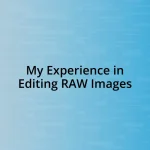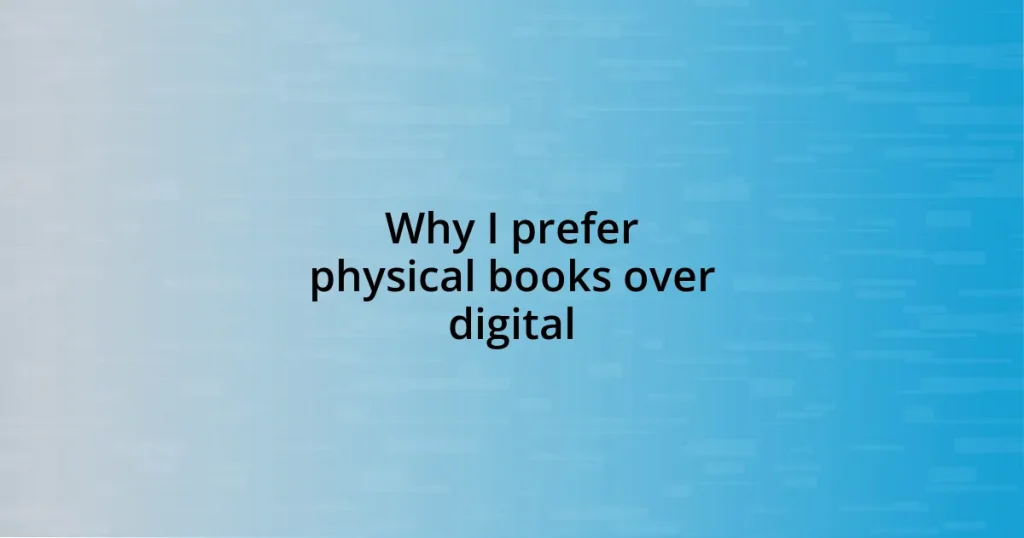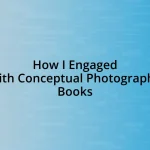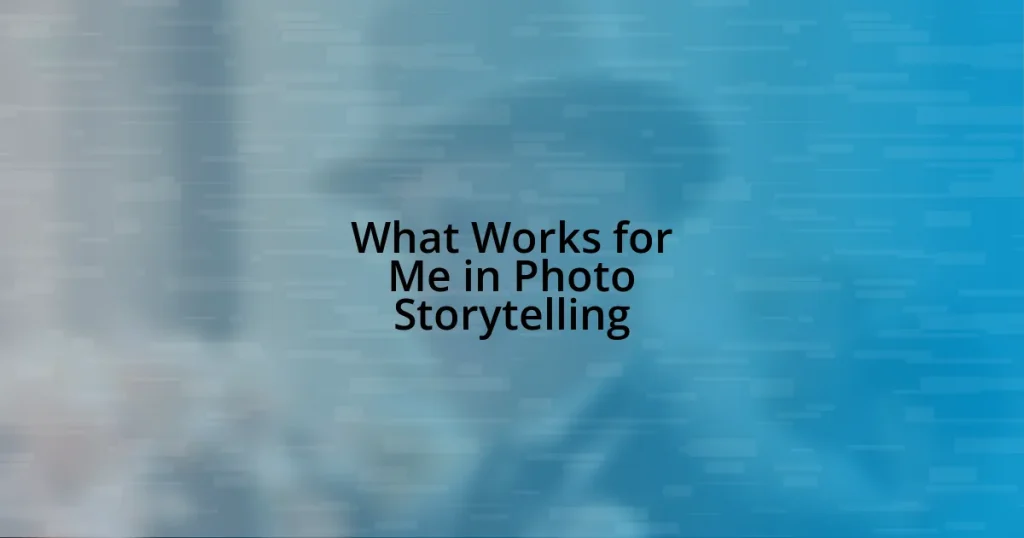Key takeaways:
- Physical books offer a unique sensory experience and emotional connection that digital formats often lack, fostering deeper engagement and memory retention.
- Digital reading can lead to eye strain, distractions, and uncertain ownership, making many readers prefer the tangible nature of physical books.
- Preferences for reading formats vary by age group, with younger generations leaning towards digital options for convenience, while older readers cherish the tactile aspects of physical books.
- The future of reading is likely to see a blend of physical and digital formats, as new technologies emerge, impacting how stories are consumed and experienced.

Benefits of physical books
One of the most delightful aspects of physical books is the sensory experience they offer. I vividly remember the smell of old pages at my favorite used bookstore; each book seemed to carry its own story, not just from its text but from the life it had lived. Don’t you think there’s something magical about flipping through the pages, feeling the weight of the book in your hands, and even hearing the soft rustle of paper as you turn each page?
Physical books also create a tangible connection to the content that digital formats often miss. I find that marking up a book—underlining passages or jotting down notes in the margins—makes the ideas resonate more deeply. When was the last time you felt emotionally invested in a digital document the way you do with a book you’ve highlighted and personalized?
Lastly, let’s talk about the aesthetics of physical books. A well-stocked bookshelf can be a conversation starter and a reflection of who you are. I take pride in my collection; each title tells a part of my story. Have you noticed how displaying books can bring warmth and personality into a space? There’s a unique charm in curating a library that digital formats can’t replicate.
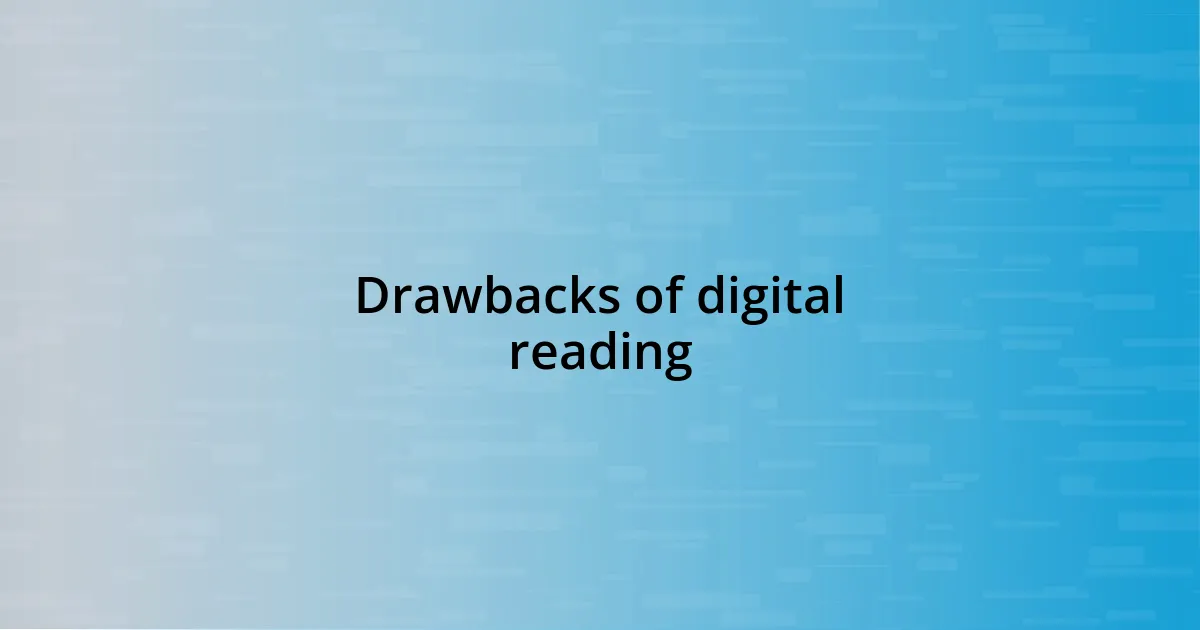
Drawbacks of digital reading
Digital reading certainly has its merits, but there are notable drawbacks that often go overlooked. One immediate concern is the strain it puts on our eyes. I’ve personally experienced discomfort after long reading sessions on a screen, something I rarely encounter with physical books. The harsh blue light and continuous scrolling can make it hard to focus, leading me to wonder if the convenience of e-readers truly outweighs this critical issue.
Another factor to consider is the potential for distractions. When I read digitally, there’s always the temptation of notifications pinging in the background. I’ve found myself losing track of the story because I couldn’t resist checking that message or notification. It feels so much different when I’m nestled on the couch with a physical book, the world around me fading away as I immerse myself in the narrative.
Finally, let’s talk about ownership. With digital books, I often feel uncertain about what I truly own. I’ve had instances where licenses expire or e-books become inaccessible, leaving me frustrated. I remember a time when a favorite novel I purchased digitally vanished without warning. That’s a scenario I would never encounter with a physical book that I can hold onto and cherish.
| Drawbacks of Digital Reading | Personal Insights |
|---|---|
| Eye strain from screen time | I’ve experienced discomfort that a physical book avoids. |
| Distractions from notifications | It’s hard to focus when my phone is always within reach. |
| Uncertain ownership of digital files | Losing access to e-books has been frustrating for me. |

Emotional connection with physical books
There’s something incredibly special about the emotional bond I form with physical books. I remember the day I found a dusty copy of my favorite childhood story in my grandmother’s attic. As I held that familiar, worn cover, a wave of nostalgia washed over me. Each crease and smudge told a story of its own, reminding me of countless nights spent lost in that narrative. The joy of uncovering that book brought me back to magical moments of discovery and comfort, emotions that a digital file just can’t replicate.
- Nostalgia: Physical books evoke memories tied to specific moments in my life, like that attic find.
- Personalization: I cherish how I can leave my mark on a book, transforming it into a reflection of my journey with notes and highlights.
- Permanence: There’s reassurance in the idea that a physical book will always be there, a tangible piece of my past, present, and future.

Impact on memory retention
When I read a physical book, I often find that I remember the content far better than when I read digitally. This isn’t just a personal observation; studies suggest that the tactile experience of turning pages and the physical weight of a book can enhance memory retention. I can still vividly recall passages from novels I’ve read in print, while digital texts often blur after I close my device.
There’s a particular moment I treasure: I was sitting in a cozy café with a paperback. As I flipped through the pages and absorbed the words, I felt connections forming between the narrative and my own experiences. It’s fascinating how the brain processes information differently based on the medium; for me, the act of physically interacting with a book seems to cement those memories deeper into my mind. Have you noticed this in your own reading habits?
The ambience of a quiet space with a physical book can also play a significant role in how well I remember what I’ve read. I’ve found that distractions are minimized when I’m fully engaged with a printed text. It’s almost as if the book absorbs my focus, allowing for a more profound understanding. The pleasure of losing myself in a physical book sparks my curiosity, which, I believe, enhances retention even further.

Environmental considerations of physical books
Choosing physical books over digital options also leads me to consider their environmental impact. While both formats consume resources, I find that physical books can be more sustainable when sourced responsibly. For instance, I’ve discovered publishers who prioritize using recycled paper and environmentally friendly inks, which aligns with my values around preserving nature.
One memory that stands out is when I visited a local bookstore that highlights its commitment to sustainability. They only stock books produced from sustainably sourced materials and even encourage book swapping within the community. This initiative made me realize that by purchasing physical books, I can support eco-friendly practices and contribute to local economies while fostering a love for literature.
Of course, I recognize that the production of physical books involves logging trees and using energy, which can be detrimental to the environment. But I often wonder: isn’t it also about how we choose, use, and care for these books? I try to make my reading choices count; for every book I buy, I endeavor to either donate it afterward or share it with friends. This way, I feel like I’m making an effort to minimize waste while spreading the joy of reading.
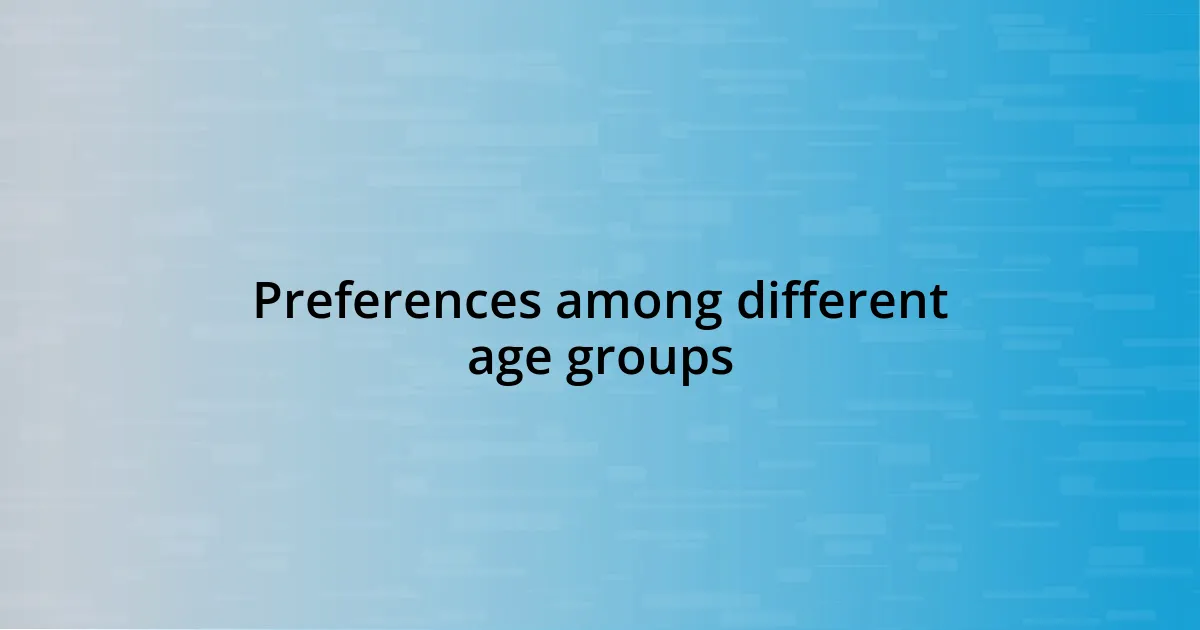
Preferences among different age groups
Interestingly, preferences for physical versus digital books often vary greatly among age groups. Younger readers, who have grown up with technology, may lean toward e-books because of their convenience and portability. I recall discussing this with my niece, who always has her tablet handy, enjoying the instant access to a vast library. Yet, she admitted that I seem to hold a nostalgic charm for the smell and feel of my beloved hardcover novels.
On the other hand, older generations typically show a stronger affinity for physical books. Many of my friends in their 60s reminisce about the tactile joy of flipping through pages and the comfort of seeing their collection on a shelf. It’s heartwarming to hear their stories about how books played a significant role in their lives, often associated with treasured moments—like reading to their children at bedtime. This emotional connection often shapes their preference for the tangible over the virtual.
Moreover, I’ve encountered readers in their 30s and 40s who find themselves caught in the middle. They enjoy the benefits of both mediums but often lean toward physical books for deeper engagement. Personally, I still remember the last time I borrowed a physical book from a friend and how the experience fostered a sense of shared discovery as we discussed its themes over coffee. Isn’t it fascinating how reading preferences can reflect not just age, but a spectrum of shared experiences and emotional connections?
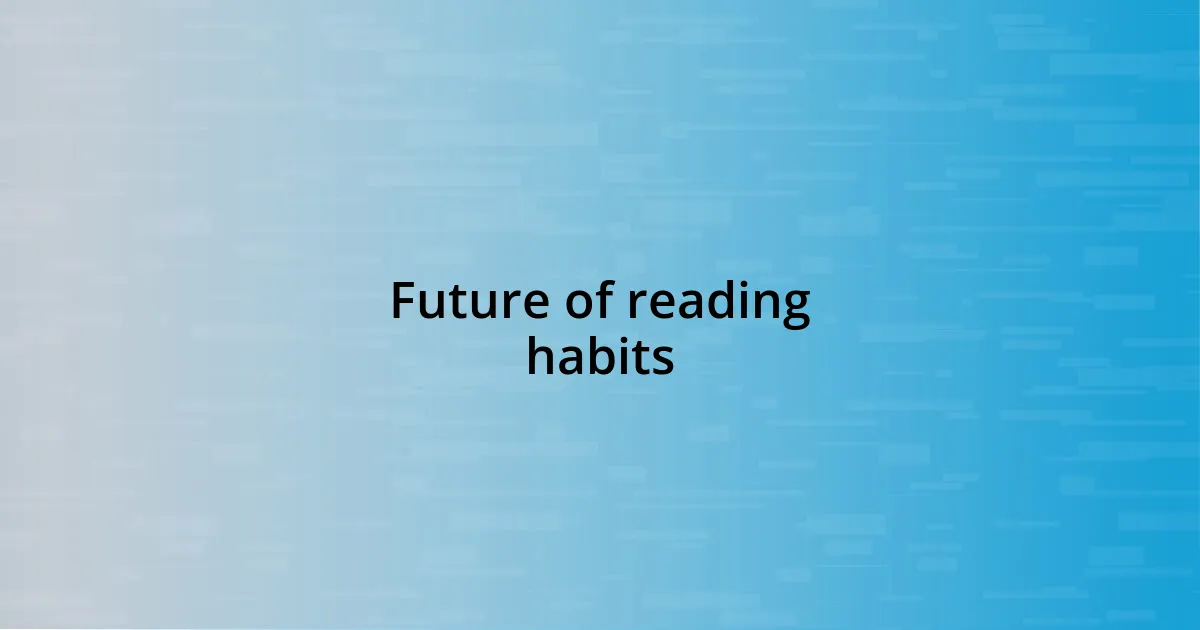
Future of reading habits
The future of reading habits seems to be evolving, merging technology with traditional methods in ways we might not have anticipated. I often think about how the growing availability of audiobooks and interactive e-books could create a new reading culture. Picture this: a cozy evening at home, but instead of curling up with a paperback, you’re engaging with a story that visually animates right in front of you. Doesn’t that blend the best of both worlds, sparking curiosity about how we’ll consume stories in the years to come?
As I navigate through conversations with friends about this shift, I sense an overwhelming desire for experience even amidst the digital tide. For example, I remember a lively discussion I had at a book club where members shared how the tactile experience of reading enhances their connection to the story. Some of us even expressed concern that the digital format might dull the emotional impact of a well-crafted narrative. It makes me wonder—will our attachment to the physical book fade away altogether, or will it find new ways to coexist with the digital age?










